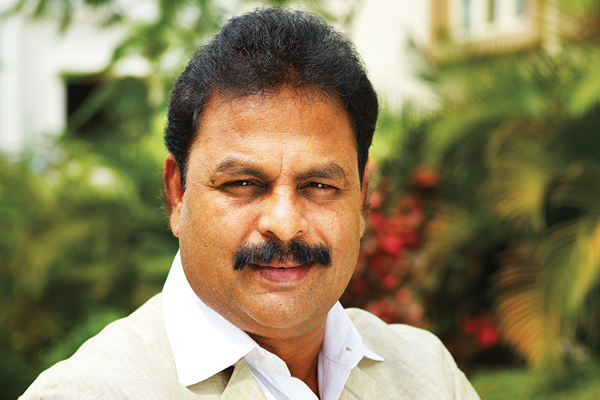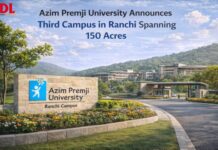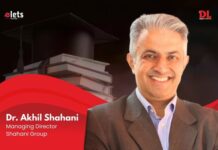

Founder and MD, Futuristic Edu Initiatives, Hyderabad
Futuristic Edu Initiatives forayed into the field of education with a one-point agenda of providing world-class education to children to make them globally competitive. Today, with commitment and dedication, the group has redefined education with its progressive concepts, says Narendra Prasad E, Founder and MD, Futuristic Edu Initiatives, Hyderabad, in conversation with Elets News Network (ENN).
What are your expectations from the Government’s new education policy? How will it change the face of the education in India?
The present education system is designed as one size fits all specially in primary and secondary schools. In this system students get limited chance to explore their interests in arts, music and sports as the curriculum is rigid. This system gives no freedom for students to choose their interests thus leaving the students to feel bored or uninteresting, which further leads to failure. We think that the students should enjoy learning, which can only happen only if, their interests are aligned with the curriculum, which further improves students self confidence. We believe this helps the student to develop an attitude towards learning, which further enhances the personality of the students and gives him/ her enough courage to tackle any circumstances in life and contribute for society.
At undergraduate level, the main focus of the education policy is to make students tested on the theoretical skills and awarded degrees on the marks . We feel that this can easily be obtained by reading prescribed text books and reproducing the same in the form of an answer in semester exams, thus getting a good GPA and recognised as a good engineer/doctor. But, this mere knowledge is not helping the brilliant students in their performance in the industry. We believe that on the job training and hands-on working as a part of curriculum will give more practical approach of the concept to the student. For this to happen, we proposed to bring in Industry experts and professional professors from the renowned University all over the world to come together to redesign the syllabus. Another challenge for many schools in India is that they have to be registered as with state department of education and also at the central department ( specially in case of CBSE ) level creating too many departments to deal with and too much documentation to support this leaving the less time and resources to schools to focus on education. With multiple education departments, there is too much confusion, for example state board says Local Language is compulsory in the list of subjects that are taught to the student, but CBSE says Hindi as compulsory subject to be taught. In such a scenario, I can only imagine a student position, whose parent frequently transfers from one state to another.
Another Policy of Government which is quite confusing is that State boards try to cap the maximum fee that can be charged by the schools and the Central Government wants to impose the Right to education Act. It would be very challenging for the school management to maintain the quality of education in such a scenario. In short, the new education policy should be unified (through the country) flexible, liberal and practical.
What are the innovative and exciting things you are planning to introduce from the new academic session?
We have tied up with Nature Nurture in developing a theme based curriculum, where our children are exposed to education content in various different forms (digital CSS, books, activities, classroom decoration, Theme assemblies, student conferences) and bringing them closer to real life usage of the education content. This is further helping our students in developing multiple intelligences. This year, we have started Hobby clubs like Astronomy club, Photography club, Cookery club, Art club etc and we are a making sure that student participate in at least one such club to explore his/her interests.
We have introduced Butterfly fields’ lab as an extension of science lab, which is helping our students to understand complicated science concepts using small experiments. This year, we are proud to announce that we have started a very unique SI Unit (Special Interventions Unit) which is headed by Deputy Head Academic, Senior Psychologist to understand the special needs to slow learning and as a part of the programme we are also engaging a shadow teacher to cater exclusively to slow learners.
“We believe that on the job training and hands-on working as a part of curriculum will give more practical approach of the concept to the student. For this to happen we proposed to bring in Industry experts and, professional professors from the renowned University all over the world to come together to redesign the syllabus.“
How are you incorporating the emerging technologies in your existing curriculum?
This year we have tied up with mind box for setting up a STEAM lab (Science, Technology, English, Arts, Mathematics Lab ), which is helping us in delivering key subject concepts using digital designing and some of the industry standard software like Coral draw, Photoshop AutoCA, Pro-E, etc. Our students are able to print their digital design using 3D printers and see that their designs come to life. We are also encouraging our students to design online games, and many are willing to participate in the game design championship.
We have introduced Robotics to our students, which we helping them to design and code the Robotics and have a plan to send our students to world Robotics challenge in next two year. We have tied up with Wordsworth group to establish an English lab, which would help our students with communication skills. Our Teachers are using the digital content available in the open source to create custom eBooks, so that our students can learn various concepts in digital platform at their own pace.
What are the challenges that schools face in keeping pace with the present day requirements of education ecosystem?
We think that the present Curriculum is too rigid and leaves very less scope to modify, or innovate. We think that the examination system is little outdated as it does not help teachers to implement differentiated learning in the classrooms.
What are your plans regarding the expansion of ‘Futuristic Edu Initiatives’?
We are trying to develop a framework, to assess the students’ interests, their learning levels in different subjects and create a student learning profile, and our teachers will be using it to understand students’ progress. Using this student profiling we would like to introduce differentiated learning in the classrooms. We believe that, in future this would help us in customizing the lesson plan to individual student level thus helping the student to make learning easy and enjoyable. We would like to use this framework to develop a digital system to track student progress.























